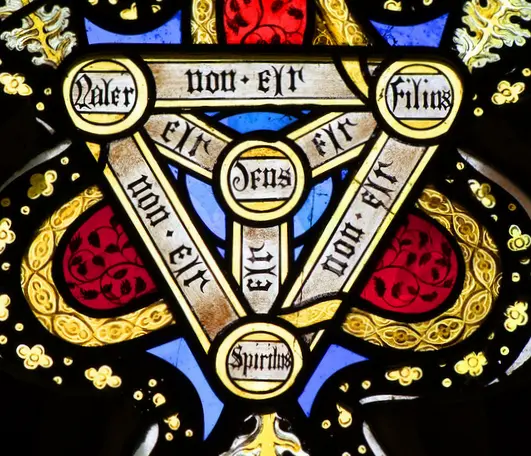The Threeness of God

Questions 4-5 of the Shorter Catechism were talking about the whatness of God, but when we get to question 6, we finally move to whoness of God.
Q. 6. How many persons are there in the godhead?
A. There are three persons in the Godhead; the Father, the Son, and the Holy Ghost; and these three are one God, the same in substance, equal in power and glory.
The doctrine of the Trinity can be summarized in four simple propositions:
- There is one God.
- The Father is God.
- The Son is God.
- The Spirit is God.
Of course, the doctrine of the Trinity is a very deep well; there’s quite a lot we could say about it. But if you hold fast to these four truths, you’ve got the basics down. We’ve already dealt with the oneness of God, so let’s focus on the last three propositions.
When we say “Father, Son, and Spirit,” what we’re really doing is naming the three persons of the Trinity. More precisely, we’re receiving the names that God has given us. A name does several things, but principally, it communicates something of a person’s nature and of his relationships. Consider your own name. When someone hears your name, they think about what you’re like, how they perceive you, and they think about who you’re related to (you’re a Smith or a Jones or something else). The same is true of the names of the persons of the Trinity.
The Father is the origin or source of the Trinity. A father is one who begets others. This, then, is part of the particularity of the Father: he begets. But this also implies that someone in begotten. That is the Son. The Son receives his divine life from the Father.1 That is why he is called the Son, because sons are begotten of their fathers. Finally, the Spirit is breathed out by both the Father and the Son. We call this spiration or procession.
So the Father is Father because he is unbegotten. The Son is the Son because he is begotten. The Spirit is the Spirit because he is breathed out. Got it? Probably not, but remember that we’re dealing with something beyond our understanding. At the same time, Christians must affirm these things; otherwise, we deny fundamental truths about God, and ultimately about the gospel.
But why does this matter? What’s the point? The answer is that the doctrine of the Trinity is closely related to God’s self-sufficiency. We can illustrate this with one simple example. The Bible tells us that God is love (1 John 4:8). But that fact about God means that there must be an object of God’s love. Relationship is of the essence of God; he cannot be love is there is no beloved. Reflecting on this reality in the fourth century, Augustine described God’s persons in terms of love. He said the Father is the Lover, the Son is the Beloved, and the Spirit is the Love they share. That is, of course, an imperfect analogy, but it gets an important reality: God exists in relationship.
This also has gospel implications. Our salvation rests on this love in God expressed in creation. The Father saves us because he loves his Son and has promised to give him a people for his Bride. That’s why salvation is grounded on union with Christ. Because we are covenanted with Christ in the New Covenant, we are actually made beneficiaries of the love that is shared within the Trinity. The love that God has for us is the same love he has for the Son. So we can rejoice in this truth: in Christ, we have been made partakers of the divine nature (2 Peter 1:4), that is, we have been invited into this eternal relationship.
Your friend in Christ,
Reid
-
In Reformed theology, we also affirm that the son is autotheos, God in himself. Jesus himself affirms this John 5:26. That’s a very complicated discussion, but the gist is this. The Son is only begotten with respect to his person. But his essence is shared with the Father, and the divine essence is autotheos. ↩︎
